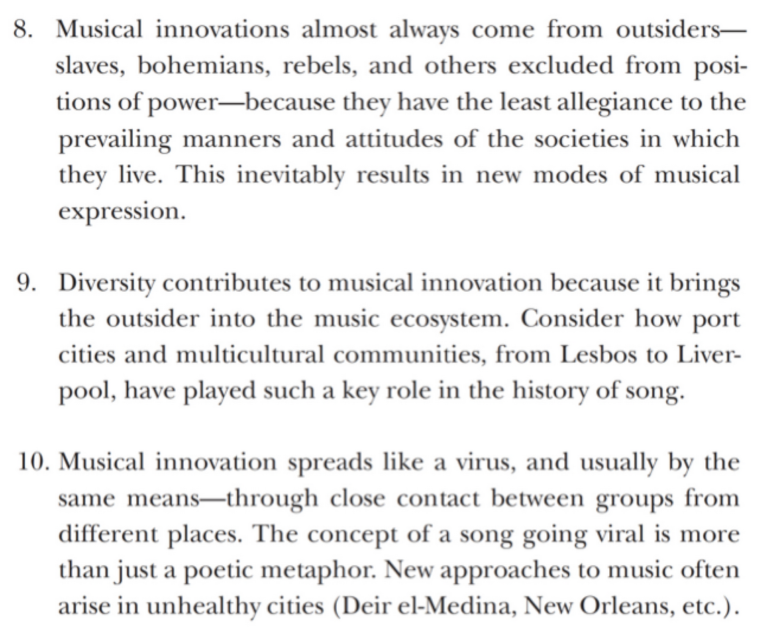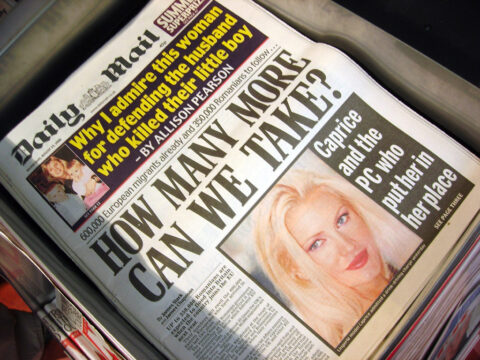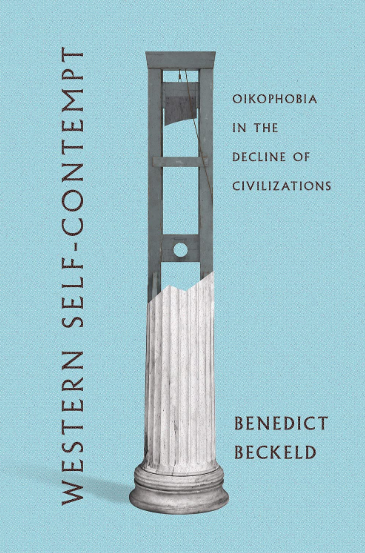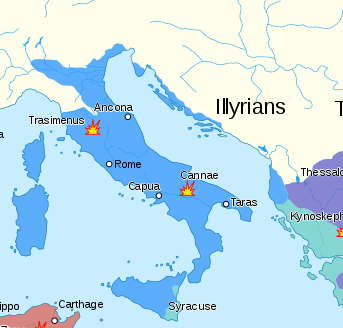In places where half the population is the size of a beached whale, people dress in such a way that emphasizes rather than disguises or makes dignified their size. They love tight fits and bright shades — shocking pink and apple green, for example — as if challenging passersby to take notice of them and utter an insult, so that they can then feel aggrieved. In fact, it is they who are aggressive: They know both that one cannot fail to find them grotesque and that one is prevented by social convention and the desire to be polite from demonstrating either by word or facial expression that one finds them grotesque. It must be the same with the photos of themselves that they show. There is no physical exercise that can compare to that of holding one’s tongue.
This is why the doctrine of multiculturalism, far from making people behave better and more sensitively to the feelings of others, allows them to behave worse and less sensitively to the feelings of others. It is almost normal or instinctive human behaviour when in unfamiliar social surroundings to look around and see how other people are behaving, estimate what might offend them, and adjust one’s own conduct accordingly. Of course, one sometimes gets it wrong, but at least one tries. However, if multiculturalism is the demand that we accept the conduct of others, it is at least as much the demand that they accept our conduct, whatever it might be. And therefore there is no need for us to adjust it merely for their comfort.
Theodore Dalrymple, “Suit Yourselfie”, Taki’s Magazine, 2017-09-16.
August 25, 2023
QotD: Passive-aggressive “fashion”
May 18, 2023
QotD: The unironic joys of British cuisine
In the 18th century, when William Hogarth wished to highlight Britain’s political and cultural superiority to pre-revolutionary France in immediately appreciable terms, he did so through the medium of food, distinguishing between the Roast Beef of Olde England, and the ruddy and rotund yeoman nation fattened on it, and the scraps of putrid flesh with which scrawny Frenchmen were forced, beside the crumbling gate of Calais, to satisfy their wants. For food and political nationhood go together like few other cultural products: witness the squabbling between Israel and Palestine over the right to commercialise hummus, Greeks and Turks over baklava, or of Russians and Ukrainians over ownership of borscht. Food is, after all, inherently political, a basic building block of national identity, and it is the humblest foodstuffs, the basic comfort foods of childhood, that are more often fought over than the elaborate confections of the great chefs.
Indeed, it would be trivially easy to trace the shifting faultlines of broader political currents through the prism of food. Witness the sudden shift within America’s food culture, as a previous generations’ celebration of the diverse culinary options provided by mass immigration has morphed into stern lectures from diaspora commentators on the vaguely-defined evils of white people appropriating “ethnic” cuisine. In Britain, equally, a slim volume could easily be written on the political import uncomfortably burdened on fish and chips or chicken tikka masala by devotees of mass migration; a cultural theorist could likewise tease apart the “Proper” label now applied to a distinct category of foodstuff — proper pies, proper burgers, proper chips — as a marker of a specific type of middle-class yearning for proletarian authenticity, while maintaining socially acceptable levels of consumption standards. Like the fetishised fry-ups of London caffs in prosperous areas targeting themselves at tracksuit-wearing millennial creatives, the Proper Burger is the self-consciously gentrified football terrace of our national cuisine, a cultural marker of a precisely measurable socioeconomic bracket.
When this dynamic is considered, Britain’s strange relationship with food, and with its own national cuisine, becomes worthy of analysis. Though much mocked by online Americans, presumably inured to the Lovecraftian horrors of their own food culture, British cuisine at its best is hearty, simple fare, showcasing the natural bounty of these islands, our waters rich with fish and seafood (much of it exported abroad to more appreciative consumers), our rain-soaked pastures the nursemaid of the free-range meat and rich dairy goods Britain has excelled in for millennia. At its best, British food displays the worth of good ingredients cooked well — and at its worst, of poor ingredients cooked badly.
Yet the much-vaunted culinary renaissance in British food from the Nineties on, despite the buoyant effect of an endless stream of glossy cookbooks on the publishing industry, does not seem to have had an appreciable effect on the food most of us eat from day to day. Which British office worker does not recognise the moment of weary, grudging submission to the lunchtime meal deal, the limp and soggy sandwich which fuels the nation’s economy? If Britain has a national dish, it is more likely to be the Ballardian misery of the provincial train station panini, simultaneously scorching hot and half-raw, than it is a steaming steak and ale pie, its crust crisp with suet, or a plate of sizzling lamb’s liver fried in butter with farmhouse bacon.
There is, as there is with every aspect of British life, a strong class dynamic to British food. The most fervent appreciators of the frugal peasant dishes of the past, the nation’s only consumers of stewed beef shin or lamb sweetbreads, are more likely to be upper-middle class, middle-aged executives, who by lunching at St John or the Quality Chop House celebrate the forgotten folkways of their own country, than the call centre workers or shop assistants who have replaced our rural and industrial proletariat. Yet who in Britain is immune to the sudden craving for comfort satiable only by a serving of rich cauliflower cheese or of dark and savoury cottage pie, or has not felt the hobbit-like “Why shouldn’t I?” satisfaction of choosing the fry up at a hotel breakfast over the continental pastry selection?
Aris Roussinos, “How Britain eats itself”, UnHerd, 2023-02-03.
May 9, 2023
Apparently, we are all misunderstanding the Trudeau masterplan
All the smoke about Canada not having a national identity is there to hide Justin Trudeau continuing his father’s masterplan to DESTROY QUEBEC:
“Quebec caught in a trap. French forced into decline. Its political influence doomed. 12 million residents in Montreal. Quebec with 5 million. Ottawa’s grand plan explained. Justin is smarter than we think. They want to assimilate us all. All this, without any debate. Two catastrophic scenarios.”
Forget King Charles III’s coronation or the Liberal Party Convention. If you woke up Saturday morning in Quebec, this was the apocalyptic front page that graced your browser, courtesy of the Journal de Montreal:
The Journal‘s cri-de-coeur was in response to the federal government’s increase in the annual immigration level to 500,000 people. This increase, designed to boost the population of Canada to 100 million by the end of the century, would marginalize Quebec’s influence within Canada. It is estimated that Quebec’s overall share of the Canadian population would fall from 25 to 10%, while francophone Quebecers would be in the minority within their own province for the first time in 500 years.
This would displace Quebec from the center of power in Canada. Its official language, French, would be relegated to the same status as all languages and cultures other than English. Instead of being one of Canada’s two official languages, French would merely be one of many, and Quebec, no longer a nation, but a province like any other.
But wait: Journal authors further suggest that this was the grand plan of Prime Ministers Justin and Pierre Elliott Trudeau all along. In a very colorful column, “How the Trudeaus Drowned Quebec“, columnist Richard Martineau even compares the current PM to the protagonist of an infamous Stephen King novel:
“For Justin, Canada is not a country.
It is a hotel, an Airbnb.
And Quebec is just one of the many rooms in this vast real estate complex.
Room 237, here. Like the one in the movie The Shining.
Come, drop your bags and settle in! All we ask is that you pay your taxes.It’s true that Trudeau Sr. paved the way for the reduction of Quebec’s power in Canada, but it didn’t start with his 1981 Charter of Rights, as the Journal claims. It actually began a decade earlier, in 1971, with the creation of Canada’s Official Multiculturalism Policy. The policy enshrined the idea that linguistic and cultural minorities in Canada should be encouraged to preserve their heritage, and allocated federal funding to help them do so.
Official multiculturalism was both a vote-getter for the Liberals and a means of diffusing the English-French “two solitudes” paradigm that was threatening to tear the country apart. At the time, Canada had just lived through the October Crisis of 1970, which had seen Trudeau invoke the War Measures Act in response to terrorist acts by the Front de Liberation du Quebec. Official multiculturalism was seen as a way to boost the federalist cause by aligning the interest of linguistic and cultural minorities within Quebec with those of the federal government.
The larger impact, however, was to enshrine multiculturalism outside Quebec, where most minorities settled, and where garnering favour with different cultural communities became standard operating procedure, particularly for the federal Liberal party. Immigration thus became a politically untouchable issue, except in Quebec, where the protection of the French language continued to take precedence over concerns for minority rights.
May 2, 2023
QotD: The musical importance of the city of Córdoba
Which city is our best role model in creating a healthy and creative musical culture?
Is it New York or London? Paris or Tokyo? Los Angeles or Shanghai? Nashville or Vienna? Berlin or Rio de Janeiro?
That depends on what you’re looking for. Do you value innovation or tradition? Do you want insider acclaim or crossover success? Is your aim to maximize creativity or promote diversity? Are you seeking timeless artistry or quick money attracting a large audience?
Ah, I want all of these things. So I only have one choice — but I’m sure my city isn’t even on your list.
My ideal music city is Córdoba, Spain.
But I’m not talking about today. I’m referring to Córdoba around the year 1000 AD.
I will make a case that medieval Córdoba had more influence on global music than any other city in history. That’s probably not something you expected. But even if you disagree — and I already can hear some New Yorkers grumbling in the background — I think you will discover that the “Córdoba miracle,” as I call it, is an amazing role model for us.
It’s a case study in how communities foster the arts — and in a way that benefits everybody, not just the artists.
[…] a thousand years before New Orleans spurred the rise of jazz, and instigated the Africanization of American music, a similar thing happened in Córdoba, Spain. You could even call that city the prototype for all the decisive musical trends of our modern times.
“This was the chapter in Europe’s culture when Jews, Christians, and Muslims lived side by side,” asserts Yale professor María Rosa Menocal, “and, despite their intractable differences and enduring hostilities, nourished a complex culture of tolerance.”
There’s even a word for this kind of cultural blossoming: Convivencia. It translates literally as “live together.” You don’t hear this term very often, but you should — because we need a dose of it now more than ever. And when scholars discuss and debate this notion of Convivencia, they focus their attention primarily on one city: Córdoba.
It represents the historical and cultural epicenter of living together as a norm and ideal.
Even today, we can see the mixture of cultures in Spain’s distinctive architecture, food, and music. These are both part of Europe, but also separate from it. It is our single best example of how the West can enter into fruitful cultural dialogue with the outsider — to the benefit of both.
Ted Gioia, “The Most Important City in the History of Music Isn’t What You Think It Is”, The Honest Broker, 2023-01-26.
April 27, 2023
QotD: The unexpected sources of musical innovation
First, I need to provide some background on the sources of musical innovation. Over the course of three decades of research into this matter, I kept encountering new styles of song emerging in unexpected places — but these locations always had something in common.
These epicenters of musical innovation are always densely populated cities where different cultures meet and mingle, sharing their distinctive songs and ways of life. This intermixing results in surprising hybrids — new ways of making music that nobody can foresee until it actually happens in this hothouse environment.
New Orleans provides a great example. Around the time jazz originated in New Orleans, it was the most diverse city in the world — an intense intermixing of French, Spanish, African, Caribbean, Latin American, and other cultures. And the mixture was enhanced by the huge number of travelers and traders who came to the region because of the prominence of the Mississippi River as a business and distribution hub.
Here’s how I described this process in the appendix to my book Music: A Subversive History, where I shared 40 precepts on the evolution of human songs.
I wish I had time to defend these assertions here with empirical evidence. But we don’t have the space to do that. Let me say, however, that these statements are amply documented and supported with dozens of examples and case studies in the course of that book.
Ted Gioia, “The Most Important City in the History of Music Isn’t What You Think It Is”, The Honest Broker, 2023-01-26.
January 5, 2023
The injustices inherent in “asymmetrical multiculturalism”
Ed West traces the start of “asymmetrical multiculturalism” to a 1916 article in The Atlantic by Greenwich Village intellectual Randolph Bourne and traces the damage that resulted from widespread adoption of the policy:
“Asymmetrical multiculturalism” was first coined by demographer Eric Kaufmann in his 2004 book The Rise and Fall of Anglo-America, and later developed in his more recent Whiteshift, in a chapter charting Bourne’s circle, the “first recognisably modern left-liberal open borders movement”.
Kaufmann wrote how asymmetrical multiculturalism “may be precisely dated” to the article where Bourne, “a member of the left-wing modernist Young Intellectuals of Greenwich Village and an avatar of the new bohemian youth culture,” declared “that immigrants should retain their ethnicity while Anglo-Saxons should forsake their uptight heritage for cosmopolitanism.”
Kaufmann suggested that: “Bourne’s desire to see the majority slough off its poisoned heritage while minorities retained theirs blossomed into an ideology that slowly grew in popularity. From the Lost Generation in the 1920s to the Beats in the ’50s, ostensibly ‘exotic’ immigrants and black jazz were held up as expressive and liberating contrasts to a puritanical, square WASPdom. So began the dehumanizing de-culturation of the ethnic majority that has culminated in the sentiment behind, among other things, the viral hashtag #cancelwhitepeople.”
The hope, as John Dewey said of his New England congregationalist denomination around the same time as Bourne, was that America’s Anglo-Saxon core population would “universalise itself out of existence” while leading the world towards universal civilisation.
These ideas certainly didn’t remain in New England or even the United States, as Britain has certainly seen just how destructive they can be recently:
Late last year I wrote about the tragedy of Telford, a town in the English midlands where huge numbers of young girls had been sexually abused. Telford, along with Rotherham in South Yorkshire, had become synonymous with this form of sexual abuse, mostly committed by men of Kashmiri origin against girls who were poor, white and English.
This is the subject of an upcoming GB News documentary by journalist Charlie Peters, and it is quite clear, from all the various reports, that grooming had been allowed to carry on in part because of the different ways the system treats different groups.
Had the races of the perpetrators and victims been reversed, this tragedy would almost certainly be the subject of countless documentaries, plays, films and even official days of commemoration. But it wouldn’t have come to that, because the authorities would have intervened earlier, and more journalists would have been on the case.
Sex crime is perhaps the most explosive source of conflict between communities, and most recently the 2005 Lozells riots began over such a rumour. It is understandable why journalists and reporters were nervous about this subject; less forgivable is the way that, away from the public eye, those in charge signal how gravely they view what happened.
Until Peters revealed the story, Labour had planned to make the former head of Rotherham council its candidate for Rother Valley; this week Peters revealed that one of the councillors named in a report into the town’s failures to deal with the grooming gangs scandal has gone onto become a senior Diversity & Inclusion Manager working for the NHS. Presumably the people who hired Mahroof Hussain knew about his previous job, and still felt that it was appropriate to have him in a “diversity and inclusion” position. Again, were things different, would a Mr Smith whose council had been condemned for its handling of the gang rape of Asian girls have landed that job? The whole thing seems as morbidly comic as Rotherham becoming Children’s Capital of Culture.
Such a clear inconsistency can only exist because of socially-enforced taboos and norms which have developed over race. In Whiteshift, Kaufmann cited sociologist Kai Erikson’s description of norms as the “accumulation of decisions made by the community over a long time” and that “each time the community censures some act of deviance … it sharpens the authority of the violated norm and re-establishes the boundaries of the group”. Every time an individual is punished for violating the anti-racism norm, it strengthens society’s taboo around the subject, to the point where it begins to overwhelm other moral imperatives.
Then there is regalisation, the name for the process “in which adherents of an ideology use moralistic politics to entrench new social norms and punish deviance”, in Kaufmann’s words. This has proved incredibly effective; after paedophilia or sexual abuse, racism is perhaps the most damaging allegation that can be made.
Few people wish to be accused of deviance, which perhaps explains why Peters’s story has received so little coverage in the press this week. Again, were the roles reversed, it’s not wild speculation to suggest that it would feature on the Today programme, seen as clear evidence of racism at the heart of Britain. When the Telford story broke, it did not even feature on the BBC’s Shropshire home page.
November 26, 2022
Britain’s experiment with mass immigration since 2014
Ed West considers the legacy media’s quick dismissal of conservative concerns about rising immigration from poorer European countries in 2014 with the reality only eight years later:
It was a sort of mini-publicity stunt by Vaz, but all for a good cause: a response to fear mongering by the Right-wing press who warned that we’d be “flooded” by Romanians, and predictions by MigrationWatch that’d we have 50,000 new arrivals a year from the A2 countries (as Romania and Bulgaria were called).
Twitter that day was full of journalists and other public intellectuals laughing about how we were going to be “swamped”. Why would Romanians, after all, want to come here, to this miserable rainy island?
“We’ve seen no evidence of people who have rushed out and bought tickets in order to arrive because it’s the 1st of January,” Vaz concluded.
Various publications, with the ill-founded confidence so often found in the journalist trade, soon declared that the Romanian influx was a conservative fantasy.
“Eastern European invasion comes to nothing”, the Independent declared on the day, just a tad prematurely you might say.
A Guardian commentator suggested the year before that the number of Romanians and Bulgarians arriving might actually fall following accession, and that “all the ‘invasion’ predictions … have more in common with astrology than demography.”
[…]As it turned out, in the year to September 2015, 206,000 Romanians and Bulgarians took out a National Insurance number, meaning they were registering to work here. By late 2017, there were 413,000 Romanian and Bulgarians living in Britain, suggesting 90,000 had arrived each year since January 2014, while just 6,200 Britons had made the opposite journey.
By mid-2018, there were more than 400,000 Romanians in Britain, making them one of the largest national minorities in England. The real figure is hard to tell, because the British state has lost the capacity or will to count the number of foreign residents, and it may be higher.
[…]
The scale of immigration in the 2000s and 2010s led to the rise of Ukip, the referendum and the political chaos that followed; what follows now we can’t yet say, but no one has seemed to have learned the lesson: that in the 21s century, because of easier travel, smartphones, smuggling networks and establishment communities in the West, the sheer scale of potential migration is astronomical. Yet people often have a very 20th or even 19th century understanding of how much people are able and willing to move, which makes them vastly underestimate the potential numbers arriving.
The Turkish Cypriots of north London are a case in point, the example Paul Collier used in Exodus to show the huge extent of potential migration between countries with different levels of wealth.
Because of colonial links, North Cyprus had free movement with Britain and so provided a test case: as a result, there are now more Turkish Cypriots in Britain than in Cyprus. In fact, not only did the majority of Turkish Cypriots move, but back in their homeland they become outnumbered by arrivals from a third, even poorer country, mainland Turkey, who are permitted to settle there.
In a theoretical world of open borders, Britons would be outnumbered very quickly; infrastructure would start to buckle under the strain, and governments would find it difficult to increase the necessary number of houses, schools, hospitals and other services for this expanded population, because society would now lack the social capital and cohesion to make the personal sacrifices. People would begin to lose faith in the police, a difficult role in such a transient and diverse society, and politics would become increasingly unstable and aligned along ethnic lines.
September 30, 2022
History Re-Summarized: The Roman Empire
Overly Sarcastic Productions
Published 16 Sept 2022
The plot twist of Rome is that it was always a mess, now sit back and enjoy the marble-covered mayhem.This video is a Remastered, Definitive Edition of three previous videos from this channel — “History Summarized: The Roman Empire”, “History Hijinks: Rome’s Crisis of the Third Century”, and “History Summarized: The Fall of Rome”. This video combines them all into one narrative, fully upgrading all of the visuals and audio, with a substantially re-written script in parts 1 and 3.
(more…)
July 15, 2022
QotD: Modern and historical multiculturalism
For history’s rare multiracial and multiethnic republics, an “e pluribus unum” cohesion is essential. Each particular tribe must owe greater allegiance to the commonwealth than to those who superficially look or worship alike.
Yet over the last 20 years we have deprecated “unity” and championed “diversity”. Americans are being urged by popular culture, universities, schools and government to emphasize their innate differences rather than their common similarities.
Sometimes the strained effort turns comical. Some hyphenate or add accents or foreign pronunciations to their names. Others fabricate phony ethnic pedigrees in hopes of gaining an edge in job-seeking or admissions.
The common theme is to be anything other than just normal Americans for whom race, gender and ethnicity are incidental rather than essential to their character.
But unchecked tribalism historically leads to nihilism. Meritocracy is abandoned as bureaucrats select their own rather than the best-qualified. A Tower of Babel chaos ensues as the common language is replaced by myriad local tongues, in the fashion of fifth century imperial Rome. Class differences are subordinated to tribal animosities. Almost every contentious issue is distilled into racial or ethnic victims and victimizers.
History always offers guidance to the eventual end game when people are unwilling to give up their chauvinism. Vicious tribal war can break out as in contemporary Syria. The nation can fragment into ethnic enclaves as seen in the Balkans. Or factions can stake out regional no-go zones of power as we seen in Iraq and Libya.
In sum, the present identity-politics divisiveness is not a sustainable model for a multiracial nation, and it will soon reach its natural limits one way or another. On a number of fronts, if Americans do not address these growing crises, history will. And it won’t be pretty.
Victor Davis Hanson, “Things That Can’t Go on Forever Simply Don’t”, PJ Media, 2019-04-17.
June 21, 2022
“Schlimmbesserung is a lovely German word which means making something worse by trying to improve it”
In the New English Review, Armando Simón considers some of the oddities of American worldview that seem so often to make worse the very things they try to “fix”:
Americans’ ignorance of other countries, their cultures, their history and their geography is legendary and world renowned and the subject of countless anecdotes and jokes by foreigners. This ignorance is inexplicable, as it is not found in America’s northern or the southern neighbors, so it cannot be due to geographical isolation. It is also a fact that foreigners know more about America than Americans know of their countries. Or even their own.
It is also a paradox. One would expect logically that a country that is principally composed of immigrants and the descendants of immigrants would have an encyclopedic knowledge of other countries, as is the case with Britain, which had a world-wide empire. Not so.
And this may explain America’s unintentional policy of schlimbesserung, the worsening of something that it is trying to improve, or as Greene described it so aptly of an American character in one of his novels, “armored in his ignorance and good intentions”.
As an aside, let me also say that this naïve optimism — to put it charitably — has enabled foreign governments to easily steal diplomatic and military secrets with little trouble, according to Gordievsky’s KGB: The Inside Story of Its Foreign Operations from Lenin to Gorbachev. John Walker, an American traitor who spied for the Russians for 17 years once said in a public interview that Walmart guards a tube of toothpaste better than the Navy guards its secrets. He should know.
Many individual American philanthropists and government bureaucrats go energetically out in the world upon hearing of some terrible condition in some part of the world through the television, convinced that they, yes they, can personally correct the situation when in reality they have no idea of what the hell they’re doing, who they are dealing with, or what is really going on in that part of the world, nor of the cultural, historical, and geographical circumstances. Nor can they even speak the local language! They are simply confident that they will solve the problem. And so they will feel good about themselves (for example, there is no question in my mind that some dirt-poor African doctors, upon learning that some idiot Americans, obsessed with AIDS, were going to send millions upon millions of dollars in their countries “to combat AIDS”, and having very few actual cases of infected patients, simply falsified the statistics. Or worse.). It is as if they were hopscotching across a cultural minefield with an idiotic grin.
The cultural values that one takes so much for granted that one is not conscious of may not be present elsewhere. For example, Americans do not understand that many countries e.g., Greece, Ireland, tend to explain their present problems by blaming other countries (Turkey, Germany, England) over what happened centuries ago instead of actually solving the problems. People in other countries are backward looking in that their sights are rigidly focused on their past, whereas Americans’ eyes are always on the future (and which might explain why Americans are addicted to science-fiction) while being generally ignorant about their past.
Also, it is a general truism that the majority of persons who run for office in North America and various European countries do so because they sincerely want to help and improve their communities/countries. However, in all of Africa and most of Asia, persons who seek public office do so for one purpose, and one purpose only: to steal everything that they can get away with. So when some ignorant, naïve, American shows up with buckets full of money, oblivious of the culture and the longstanding, entrenched, corruption, and with an announced intention to make the local community more like an American community, they are welcomed with open arms while suppressing their snickering. This also explains something where Americans exhibit willful blindness: other cultures don’t play fair. Honesty is seen as the trait of fools. Fools are to be taken advantage of. Especially in trade and diplomacy. Just look at China.
June 17, 2022
Oikophobia run rampant
In the New English Review, Theodore Dalrymple considers the prevalence of oikophobia in western culture:
In an article for the American Mind, Daniel Mahoney draws our attention to a recent book on the phenomenon of oikophobia, the dislike or even hatred of one’s own country or culture, which now seems so prevalent in western academic and intellectual circles as to be almost an orthodoxy or requirement for acceptance into the intellectual class. Of course, no social trend or phenomenon is entirely new or has an indisputable starting point: for example, George Orwell drew attention to English self-hatred many years ago. But the spread of oikophobia has been of epidemic proportion in late years.
It seems to me that Mr. Mahoney’s analysis can be extended. The first question to ask is why oikophobia should now be so prevalent. To this, I should tentatively reply that it is because of the mass intellectualization of society consequent upon the spread of tertiary education. Intellectuals have an inherent tendency to be oppositional to all received opinion or feeling, for there is no point in going to the trouble of being an intellectual if one ends up thinking and feeling what the great mass of the people around one think and feel. Love of country and inherited custom is so commonplace as to appear almost normal or natural, and much of it, of course, is unreflecting.
But intellectuals are supposed to reflect. That is their function, and they are inclined to reject received opinion, not because it is wrong but because it is received. It goes without saying that received opinion can be wrong and even wicked or evil, in which case the strictures of intellectuals are necessary and salutary; but intellectuals themselves may promote wrong or even wicked opinions, partly from the a priori need to distinguish themselves from the run of mankind.
The phobia in oikophobia is the fear of being taken for one of the common run of mankind.
The second question about oikophobia is the old one of cui bono? Again, one must not confuse the psychological or social origin or function of an opinion with its justification or correctness in the abstract, but once one has decided that an opinion is mistaken or deleterious in its effect, it is natural to ask where it comes from and what interests it serves.
In my opinion, oikophobia is generally bogus, that is to say insincere, as is its cognate, multiculturalism. The oikophobe and the multiculturalist are not really interested in other cultures, except as instruments with which to beat their fellow citizens. The reason for their lack of real interest in other countries is not difficult to find and is of very common application. The fact is that it is very difficult genuinely to enter into a culture, or subculture, other than one’s own, even when that culture or subculture is close to or adjacent to one’s own.
June 14, 2022
The Early Roman Emperors – Part 2: An Empire of Peoples
seangabb
Published 4 Oct 2021The Roman Empire was the last and the greatest of the ancient empires. It is the origin from which springs the history of Western Europe and those nations that descend from the Western Roman Empire. It is the political entity within which the Christian faith was born, and the growth of the Church within the Empire, and its eventual establishment as the sole faith of the Empire, have left an indelible impression on all modern denominations. Its history, together with that of the ancient Greeks and the Jews, is our history. To understand how the Empire emerged from a great though finally dysfunctional republic, and how it was consolidated by its early rulers, is partly how we understand ourselves.
Here is a series of lectures given by Sean Gabb in late 2021, in which he discusses and tries to explain the achievement of the early Emperors. For reasons of politeness and data protection, all student contributions have been removed.
More by Sean Gabb on the Ancient World: https://www.classicstuition.co.uk/
Learn Latin or Greek or both with him: https://www.udemy.com/user/sean-gabb/
His historical novels (under the pen name “Richard Blake”): https://www.amazon.co.uk/Richard-Blake/e/B005I2B5PO
March 3, 2022
QotD: Diversity was Rome’s strength … as is true of almost every empire in history
The actual Roman Empire was fantastically diverse and more importantly, its military success hinged on its diversity at every stage of its existence. In many games and cultural products, that diversity is obscured because we lose sight of ethnic, religious, linguistic and cultural divisions which were very important at the time, but no longer matter to us very much. Let’s take a snapshot of Roman territory in 218 B.C. to give a sense of this.
Quite a few people look at a map like that, classify most of Rome’s territories as “Italian” and assume there is a large, homogeneous ethnic core there (except, I suspect, anyone who has actually been to Italy and is aware that Italy is hardly homogeneous, even today!). But Roman Italy in 218 B.C. was nothing like that.
Peninsular Italy (which doesn’t include the Po River Valley) contained a bewildering array of cultures and peoples: at least three distinct religious systems (Roman, Etruscan, Greek), half a dozen languages (some completely unrelated to each other) and many clearly distinct cultural and ethnic groups divided into communities with strong local identities and fierce local rivalries (if you want more on this, check out Salmon, The Making of Roman Italy (1982), Fronda, Between Rome and Carthage (2010), and Keaveney, Rome and the Unification of Italy (2005)).
The Roman army was by no means entirely Roman – it was split between Roman citizens and what the Romans called the socii (lit: “allies”) – a polite term for the communities they had subjugated in Italy (a periphery!). Rome demanded military service – this was the resource they would extract – from these communities; the socii pretty much always made up more than half of the army. Diversity was literally the Roman strength, in terms of total military force. Without it, Rome would have remained just one city-state in Italy, and not a particularly important one besides.
(As an aside: while citizenship is extended to nearly all of Italy in the 80s B.C., by then Rome is making extensive use of non-Italian troops in its armies. by the early empire, half of the army – the auxilia – were non-Roman citizens recruited from the provinces. Roman armies were essentially never majority “Roman” in any period, save possibly for the third century. And before anyone asks what about even earlier than my snapshot – it is quite clear – both archaeologically and in the Romans’ own foundation myths – that Rome was a fusion-society, culturally diverse from the city’s foundation. Indeed, sitting at the meeting point of Latin and Etruscan cultural zones as well as upland and coastal geographic zones was one of the great advantages Rome enjoyed in its early history, as near as we can tell.)
Outside of Italy, narrowly construed, the diversity only increases. Sicily’s population included Greeks, Punic (read: Carthaginian) settlers, and the truly native non-Greeks. Sardinia and Corsica had their own local culture as well. Cisalpine Gaul – the Po River Valley – was, as the name implies, mostly Gallic! As the Romans expended into Spain during the Second Punic War, they would add Iberians, Celt-Iberians, and yet more Punic settlers to their empire. And even those descriptions mask tremendous diversity – Iberians and Celt-Iberians were about as diverse among themselves as the Italians were; a quick read of Strabo reveals a wonderful array of sub-groups in all of these regions, with their own customs, languages, and so on.
Even if the Romans didn’t raise military force directly from any one of these groups, they do need to raise revenue from them – remember, the entire point of having the empire is to raise revenue from it, to make other people do the farming and mining and other labor necessary to support your society from the proceeds of their tribute. To keep that revenue flowing – revenue that, as the Roman army professionalized in the late second century B.C., increasingly paid for Roman military activity which held the empire together – you need to be good at managing those groups. Empires that are bad at handling a wide array of different cultures/religions/languages do not long remain empires.
Bret Devereaux, “Collections: Why Are There No Empires in Age of Empires?”, A Collection of Unmitigated Pedantry, 2019-11-22.
November 22, 2021
QotD: Canadian values
During recent decades, our politicians have told us a sweet bedtime story about Canada being an exceptionally compassionate country, a world leader in multiculturalism and wonderfully generous to the poor countries. All of this expresses something called “Canadian values”. All lies.
Robert Fulford, quoted in “Canada takes a new look at ‘fable’ of its image”, New York Times, 2005-05-25. (Link updated thanks to MILNEWS.ca in the comments.)
May 8, 2021
QotD: That time the global elites were against diversity
There was simply no debate back then [in the aftermath of the Great War] that a mass influx of European refugees to Africa would have been a conquest, not a “humanitarian crisis” that Africans, with their ample space and nutrient-rich soil, had some kind of responsibility to sit back and accept. And to be clear, many of the European refugees who would have trekked across Sörgel’s newly reclaimed land were genuinely in need. They were impoverished, homeless, destitute. And a lot of them were fleeing political violence. Those folks were as poor, wretched, and persecuted as any Honduran is today. But in fully rejecting Atlantropa as a goal to be pursued, the international community took the position that “it sucks that you’re impoverished and mistreated in your home country, but it ain’t Africa’s problem. Stay where you are.”
See, in those days, the elites believed in keeping people in their own damn land. Hard as that might be to fathom now, that used to be a mantra of the progressive internationalists. There was a die-hard belief that the key to world peace was the separation of people, the segregation of populations by race, religion, and ethnicity. That was the entire point of the Greek/Turkish population exchange of 1923, overseen by the League in the name of keeping Greek Christians and Turkish Muslims separated for the sake of peace. As UNC Chapel Hill history professor Sarah Shields wrote in her 2016 essay in the Journal of the History of International Law, the prevailing belief at that time was that “Muslims and non-Muslims could not live together peacefully, and modernity required rejecting a diverse past in favor of a nation-state along European (unmixed) lines.”
Separation was the future, diversity was the past. Damn near 1.6 million Greeks and Turks were sent from the land of their birth to the land where they could live with those of a similar faith. Many of the other population transfers and redrawn boundaries that followed World War I were based on that same concept of giving people their “own” homeland based on characteristics like religion or ethnicity. It was simply taken as fact back then that nations function better with some level of homogeneity. That was canon back then. By the time the U.N. came around, that notion was still very much a guiding principle, as the internationalists realized that a vision of a multireligious, multiethnic Palestine was unrealistic and unattainable. And the Jews and the Arabs realized that too, which is why they started slaughtering each other, because they couldn’t bear to live in a partitioned state. Being separate but equal was not enough. They wanted to be separate and separated.
David Cole, “When Refugees Were Conquerors”, Taki’s Magazine, 2018-10-29.











